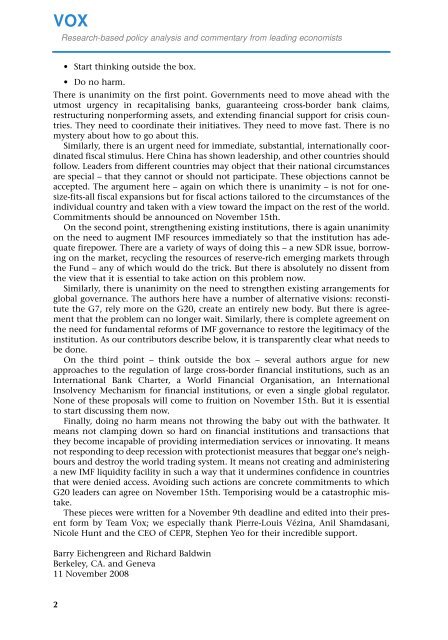What G20 Leaders Must Do To Stabilise our Economy and Fix ... - Vox
What G20 Leaders Must Do To Stabilise our Economy and Fix ... - Vox
What G20 Leaders Must Do To Stabilise our Economy and Fix ... - Vox
You also want an ePaper? Increase the reach of your titles
YUMPU automatically turns print PDFs into web optimized ePapers that Google loves.
VOXResearch-based policy analysis <strong>and</strong> commentary from leading economists• Start thinking outside the box.• <strong>Do</strong> no harm.There is unanimity on the first point. Governments need to move ahead with theutmost urgency in recapitalising banks, guaranteeing cross-border bank claims,restructuring nonperforming assets, <strong>and</strong> extending financial support for crisis countries.They need to coordinate their initiatives. They need to move fast. There is nomystery about how to go about this.Similarly, there is an urgent need for immediate, substantial, internationally coordinatedfiscal stimulus. Here China has shown leadership, <strong>and</strong> other countries shouldfollow. <strong>Leaders</strong> from different countries may object that their national circumstancesare special – that they cannot or should not participate. These objections cannot beaccepted. The argument here – again on which there is unanimity – is not for onesize-fits-allfiscal expansions but for fiscal actions tailored to the circumstances of theindividual country <strong>and</strong> taken with a view toward the impact on the rest of the world.Commitments should be announced on November 15th.On the second point, strengthening existing institutions, there is again unanimityon the need to augment IMF res<strong>our</strong>ces immediately so that the institution has adequatefirepower. There are a variety of ways of doing this – a new SDR issue, borrowingon the market, recycling the res<strong>our</strong>ces of reserve-rich emerging markets throughthe Fund – any of which would do the trick. But there is absolutely no dissent fromthe view that it is essential to take action on this problem now.Similarly, there is unanimity on the need to strengthen existing arrangements forglobal governance. The authors here have a number of alternative visions: reconstitutethe G7, rely more on the <strong>G20</strong>, create an entirely new body. But there is agreementthat the problem can no longer wait. Similarly, there is complete agreement onthe need for fundamental reforms of IMF governance to restore the legitimacy of theinstitution. As <strong>our</strong> contributors describe below, it is transparently clear what needs tobe done.On the third point – think outside the box – several authors argue for newapproaches to the regulation of large cross-border financial institutions, such as anInternational Bank Charter, a World Financial Organisation, an InternationalInsolvency Mechanism for financial institutions, or even a single global regulator.None of these proposals will come to fruition on November 15th. But it is essentialto start discussing them now.Finally, doing no harm means not throwing the baby out with the bathwater. Itmeans not clamping down so hard on financial institutions <strong>and</strong> transactions thatthey become incapable of providing intermediation services or innovating. It meansnot responding to deep recession with protectionist measures that beggar one's neighb<strong>our</strong>s<strong>and</strong> destroy the world trading system. It means not creating <strong>and</strong> administeringa new IMF liquidity facility in such a way that it undermines confidence in countriesthat were denied access. Avoiding such actions are concrete commitments to which<strong>G20</strong> leaders can agree on November 15th. Temporising would be a catastrophic mistake.These pieces were written for a November 9th deadline <strong>and</strong> edited into their presentform by Team <strong>Vox</strong>; we especially thank Pierre-Louis Vézina, Anil Shamdasani,Nicole Hunt <strong>and</strong> the CEO of CEPR, Stephen Yeo for their incredible support.Barry Eichengreen <strong>and</strong> Richard BaldwinBerkeley, CA. <strong>and</strong> Geneva11 November 20082














